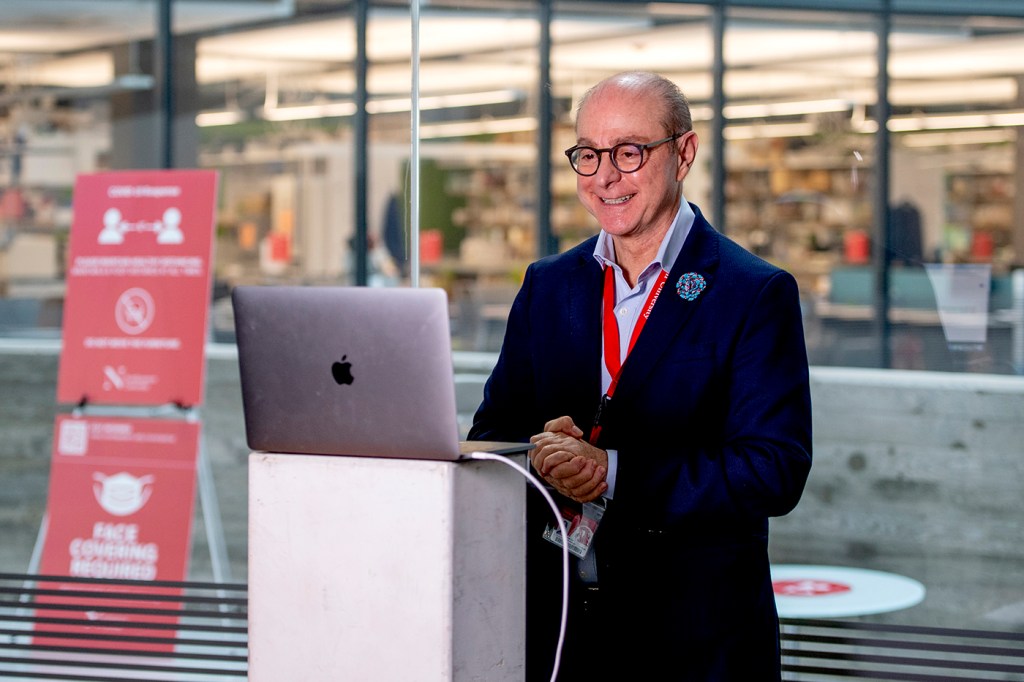Northeastern is well-positioned to lead in an uncertain future, President Aoun tells faculty senate

As universities and countries alike retrench in response to the challenges of our current world, Northeastern is forging a new path forward, said Joseph E. Aoun, president of the university, in his annual address to the Faculty Senate on Wednesday.
“This university is very attuned to the changes in the world, and is very good at being the pioneer in building new models,” Aoun said. “We have done that consistently over our history. And we feel that we are going to be able to do the same now.”
In the five years since implementing Northeastern 2025, the university’s academic plan, Northeastern has expanded its global network with new campuses in North America and overseas, extended its leadership in global experiential learning, and established new research institutes that transcend traditional academic boundaries to tackle the biggest challenges facing our world. It has been “an enormous success at all levels, in terms of the accomplishments, in terms of the goals of what we wanted to do,” Aoun said.
“But the world has changed.”
In order to meet the critical challenges of our time, the university is embarking on a new planning process that will build on the success of Northeastern 2025, Aoun said.
“We are all going to shape our future together, for 2025 and beyond,” he said.
Universities around the country have struggled to cope with the challenges of the COVID-19 pandemic, but Northeastern is already setting an example of how reopening can be done safely and well, Aoun said.
“The university reopened; we made the decision to reopen very early on,” Aoun said. “Safety was paramount. And what you have done is working. Other places are looking at us and calling us to learn from what you have done, at all levels.”
The university has created a comprehensive testing regimen to promote the safety of students, faculty, and staff who have returned to campus, which includes converting the Cabot physical education center into a testing center for members of the Northeastern community who are not showing symptoms of COVID-19 and building a state-of-the-art laboratory to process those tests.
That program has been a success so far, Aoun said.
“What the university has done, what we all have done, is invest a lot of resources in making our campus safe, healthy, and welcoming,” Aoun said, citing a seven-day positive test rate of 0.03 percent on campus. “This is the safest place in Massachusetts: safer than the grocery stores that you visit, and safer than the restaurants you go to.”
Aoun encouraged faculty who were hesitant about returning to campus to come take a look at the measures that have been put in place.
“The students want you. The students need you. And clearly, it is the case that this environment is vibrant, safe, and the wellness of our community will be paramount and will remain paramount.”
Northeastern’s global university system has also become increasingly important during the pandemic. Aoun reiterated the university’s commitment to its international students, who faced challenges as borders closed and embassies shuttered. Northeastern’s campuses in the United Kingdom and Canada can help provide resilience in these situations, Aoun said.
“In a period of retrenchment, where nationalism is coming to the fore in many countries, the fact that we have a global university system with a network of campuses is helping us,” Aoun said.
The pandemic has also redefined the way people look at research, he said. People want research to provide solutions to the problems that society is facing, and Northeastern is well-positioned to find the answers they are looking for.
“Our model is a model of a university engaged with the real world—our students demonstrate that on a daily basis,” Aoun said. “It’s a model of research that is user-inspired, which means that it is relevant and impactful.”
However, the current demands on higher education go beyond addressing the COVID-19 pandemic, Aoun said. Northeastern’s senior leadership, as well as the community at large, are also working on clear action items to address the ongoing problems of systemic racism.
“It is clear that the Black Lives Matter movement, the issues of systemic racism, and inequality became paramount and central in society. And, frankly, it caught universities and higher education, flat-footed, including us,” Aoun said. “It’s a wake-up call.”
For media inquiries, please contact media@northeastern.edu.





